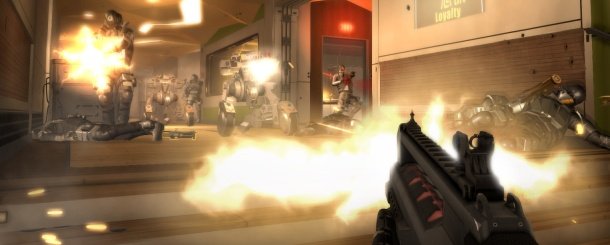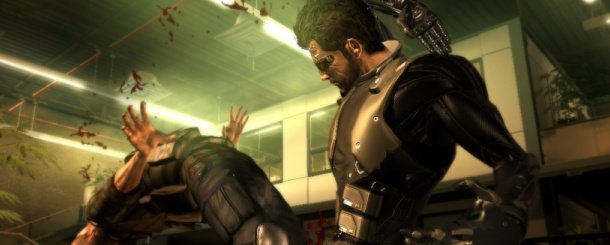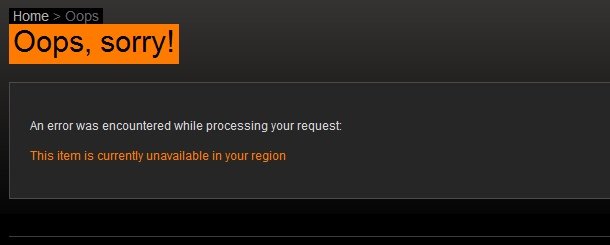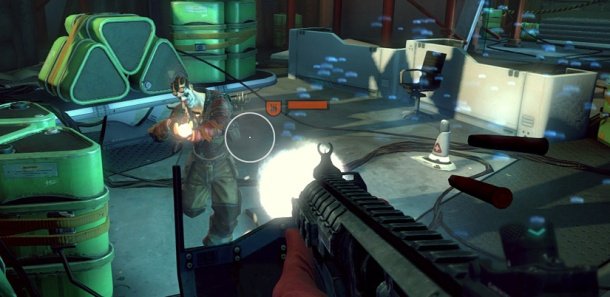GameStop and the Retail War of 2012

Gamestop's decision to pull free OnLive codes from copies of Deus Ex: Human Revolution is more than simply an unfortunate business decision. It's the first real shot in a war between publishers and retail that's been a long time brewing. Whether or not it has the right, contractually or otherwise, isn't really important in the grand scheme of things. What matters is that it did it, giving up one of the year's biggest PC games to make its point - and that's the kind of decision that ripples and echoes in the wider industry. By this time next year, stories like this won't even be a surprise.
As with all retailers out there, GameStop's problem is a complicated one. All bricks-and-mortar channels have been hit hard in recent years by both digital distribution and online sources like Amazon and Play, where you still get same-day releases, but at much lower cost. The counterattacks in recent years have been store-specific pre-order bonuses to make people come to them specifically (in the case of the forthcoming Batman: Arkham City for instance, buying from Toys R Us gets you a bonus 1970s era Batman skin, while a copy from Best Buy comes with a Red Robin variant of the Boy Wonder), which the industry has generally been happy to support, and putting a heavy focus on game trade-ins and the second-hand market instead of new sales, which has been... rather less popular.
PC games have always suffered on the second-hand market due to the perception that everyone would simply copy the game and return it, with online activation rendering most major titles effectively impossible to sell in this way. However, since regular sales don't provide the high margins a store enjoys from buying a game back cheap and selling it again at a discount, there's increasingly little incentive to stock them at all. PC gaming is still a presence in stores, but has long been the poor cousin.

Now though, with profits falling and stores closing, it's the cousin everyone wants to woo. The PC is the only major gaming platform without an owner, and the only one where anyone can simply set up a stall. Is Microsoft going to give up control of the Xbox Marketplace so that a company like Game can stay relevant as physical media wanes? Is Sony? Nintendo? No, no, and no. On PC, nobody has to. If a service like Steam gains a dominant position, it's because gamers decided to give it one, and we can just as easily take it away. It's a more democratic platform, which is a difficult mental adjustment for anyone who's previously had effectively unlimited power to make. For the last few years, companies have bent over backwards to avoid upsetting traditional retail with everything from pricing to release dates. Why do we have to wait a month to play a game that's gone gold, or a week to play one like Human Revolution in the UK, despite it being out in the US? To tie into retail schedules, and stop retailers throwing a fit.
We're already seeing publishers query the need for this kind of co-operation. Digital greatly reduces the costs of distribution, lets them keep a larger slice of the pie, and offers far more flexibility to run promotions, make a direct connection with the audience, and push extra content like DLC. The results speak for themselves. Earlier this year, Paradox Interactive's CEO Fred Wester told us: "This year we're close to ninety percent of our revenue being digital. Retail sales are like a bonus for us now. We don't really need retailers any more and that is a release because retailers have not been good for the industry."
It's a similar story for 1C Company's publishing director Darryl Still, who shared this anecdote with us in June. "One of our UK publishers came to explain why they had only managed to get 30 copies into the UK's largest retail chain. They told us there was hardly any demand for the title. At that time I had my digital sales reporting tool open, which tracks download sales instantly as they happen. I hit refresh and informed our partner: 'In the few seconds that's it has taken you to explain there is only demand for 30 units in the UK, we have sold twice as many as that digitally.'"

Even so, the industry remains skittish. Square-Enix's response to GameStop pulling out its OnLive coupons wasn't to throw around fire and bluster, but to accept the decision and even point fans to "buy the game at any one of over 4000 GameStop stores in North America or purchase a digital download copy online from www.gamestop.com" - though with GameStop almost immediately deciding to stop selling the game at all , it may have regretted that. We've also seen reports of retailers threatening not to stock games using Steamworks , primarily through fear of promoting a rival, and at least a few games that have vanished from digital distribution sites in mysterious circumstances, like Brink and Space Marine .
Keep up to date with the most important stories and the best deals, as picked by the PC Gamer team.
(Game, originally blamed for their absence, recently emphatically denied any involvement in this.)
GameStop's protest against OnLive isn't really about not wanting people to download games though. It's about not having them do it thought its own online services, rather than whatever competitors Square-Enix may have signed a deal with. GameStop has two of them right now, the direct download site Impulse , and its own forthcoming OnLive rival that it bought along with Spawn Labs . The industry has no automatic vested interest in helping new services like these become a success. At best, they're potential partners - competing with the likes of Steam, OnLive, Gaikai. At worst, they're a rival to be starved of games in favour of driving traffic to home-brewed or favoured platforms like Steam and Origin. More likely though, retailers entering the online space will just be more stalls to choose from. Their heritage gives them a name people recognise. It won't make them kingmakers. Not here. Not this late in the game.

At the same time, we shouldn't underestimate the power that retailers do still have, particularly for console games - and by extension, anyone who sells PC versions that they won't be at liberty to break the street date on either. Publishers like 1C and Paradox aren't the exception in not needing sales (though they do target a more niche audience than other publishers) but nor are they the rule. Many people do still buy from shelves, and we shouldn't forget supermarkets and other non-dedicated stores in that equation. That's why publishers have been reluctant to cut stores out of the loop, just as stores don't want to give up the explosive sales of each year's Call of Duty or other headline games.
But that's detente, not peace. As this year's stories have shown, power is primarily in the hands of the retail channel because publishers still grant it to them. The more we see F2P games and DLC and digital distribution and streaming, the less true that becomes, and the more both will try flexing their muscles to be dominant. Right now, smaller companies are bucking the system with things like boxed releases for games that made an internet debut (just this morning, copies of Super Meat Boy and Sam and Max: The Devil's Playhouse arrived in the office). Next, it'll be publishers like EA, wielding weapons like Origin, and the ability to put their games on services they have a vested interest in seeing succeed. When retailers officially become rivals, war is inevitable. And war is coming. Prepare for it in 2012.

